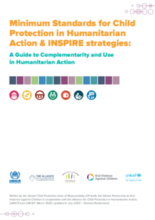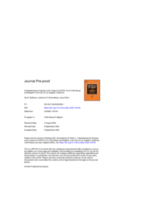Displaying 131 - 140 of 1089
In this paper, United Nations Special Representative of the Secretary-General on Violence against Children, Najat Maalla M’jid, notes that "progress towards ending all forms of violence against all children is slow and we need to act better, faster and further in bringing violence against children to an end by 2030 as per the commitment in SDG 16.2."
Drawing on semi‐structured in‐depth interviews with 31 kinship caregivers, this study sought to explore how the culturally informed traditional kinship care practice in Ghana can be considered an intervention strategy for parental neglect.
The purpose of this study is to examine parents’ reports on the response their children received to their needs during the COVID-19 crisis.
In this study, educational outcomes for 68 children (aged 3–9 years) in foster-care due to concerns about abuse or neglect were compared to those for 166 children with current or past child welfare involvement living at home.
In this article, the authors highlight a framework distinguishing experiences of trauma from experiences of deprivation and use the examples of posttraumatic stress disorder and reactive attachment disorder to demonstrate how greater specificity in our understanding of early adverse caregiving can lead to more accurate and targeted diagnosis and treatment for young children.
The authors of this paper report on the challenges and successes of their collaborative action at regional and supra-national levels, including opportunistic action.
The purpose of this note is to clarify the linkages and complementarity between INSPIRE seven strategies for ending violence against children and the 2019 Edition of the Minimum Standards for Child Protection in Humanitarian Action (‘2019 CPMS’); and to provide some practical guidance on how to use INSPIRE and the 2019 CPMS in conjunction for preventing and responding to violence against children in humanitarian settings.
In this article, the authors present child abuse and neglect data available in Brazilian public health system platform and in a national childline reporting channel (Dial 100) from 2011-2017.
In this podcast episode, Sumnima Tuladhar, a founding member and executive director of CWIN child helpline in Nepal, discusses how calls to the helpline changed when the COVID-19 pandemic reached Nepal. They discuss the processes drawn up to allow the helpline team to continue supporting children in dangerous situations.
The purpose of this study was to provide unique insights into the spatial and temporal distribution of child abuse and neglect (CAN) in relation to COVID-19 outcomes and identify areas where CAN has increased or decreased during the pandemic.


